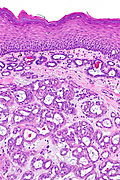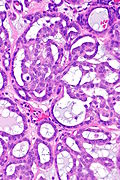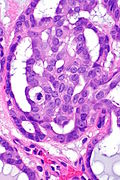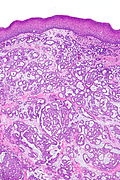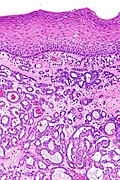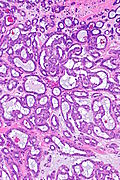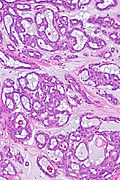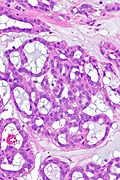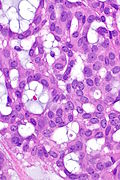Difference between revisions of "Cribriform adenocarcinoma of the minor salivary gland"
Jump to navigation
Jump to search
(→IHC: +molecular) |
|||
| (4 intermediate revisions by the same user not shown) | |||
| Line 4: | Line 4: | ||
| Width = | | Width = | ||
| Caption = Cribriform adenocarcinoma of the minor salivary gland. [[H&E stain]]. | | Caption = Cribriform adenocarcinoma of the minor salivary gland. [[H&E stain]]. | ||
| Synonyms = cribriform | | Synonyms = cribriform adenocarcinoma of the tongue | ||
| Micro = cribriform and solid architecture, cytology similar to papillary thyroid carcinoma (irregular nuclear membranes, nuclear overlap), usually covered by an intact squamous epithelium | | Micro = cribriform and solid architecture, cytology similar to papillary thyroid carcinoma (irregular nuclear membranes, nuclear overlap), usually covered by an intact squamous epithelium | ||
| Subtypes = | | Subtypes = | ||
| Line 32: | Line 32: | ||
'''Cribriform adenocarcinoma of the minor salivary gland''', abbreviated '''CAMSG''', is a rare [[malignancy]] of the [[salivary gland]], typically of the [[tongue]].<ref name=pmid21716087/> | '''Cribriform adenocarcinoma of the minor salivary gland''', abbreviated '''CAMSG''', is a rare [[malignancy]] of the [[salivary gland]], typically of the [[tongue]].<ref name=pmid21716087/> | ||
It is also known as '''cribriform | It is also known as '''cribriform adenocarcinoma of the tongue''', abbreviated '''CAT'''. | ||
The ''World Health Organization'' lumps this tumour with [[polymorphous adenocarcinoma]], a decision that is considered "controversial".<ref name=pmid29761209>{{cite journal |authors=Vander Poorten V, Triantafyllou A, Skálová A, Stenman G, Bishop JA, Hauben E, Hunt JL, Hellquist H, Feys S, De Bree R, Mäkitie AA, Quer M, Strojan P, Guntinas-Lichius O, Rinaldo A, Ferlito A |title=Polymorphous adenocarcinoma of the salivary glands: reappraisal and update |journal=Eur Arch Otorhinolaryngol |volume=275 |issue=7 |pages=1681–1695 |date=July 2018 |pmid=29761209 |doi=10.1007/s00405-018-4985-5 |url=}}</ref> | |||
==General== | ==General== | ||
| Line 42: | Line 44: | ||
Features: | Features: | ||
*Typically covered by an intact squamous epithelium.<ref name=pmid21716087>{{Cite journal | last1 = Skalova | first1 = A. | last2 = Sima | first2 = R. | last3 = Kaspirkova-Nemcova | first3 = J. | last4 = Simpson | first4 = RH. | last5 = Elmberger | first5 = G. | last6 = Leivo | first6 = I. | last7 = Di Palma | first7 = S. | last8 = Jirasek | first8 = T. | last9 = Gnepp | first9 = DR. | title = Cribriform adenocarcinoma of minor salivary gland origin principally affecting the tongue: characterization of new entity. | journal = Am J Surg Pathol | volume = 35 | issue = 8 | pages = 1168-76 | month = Aug | year = 2011 | doi = 10.1097/PAS.0b013e31821e1f54 | PMID = 21716087 }}</ref> | *Typically covered by an intact squamous epithelium.<ref name=pmid21716087>{{Cite journal | last1 = Skalova | first1 = A. | last2 = Sima | first2 = R. | last3 = Kaspirkova-Nemcova | first3 = J. | last4 = Simpson | first4 = RH. | last5 = Elmberger | first5 = G. | last6 = Leivo | first6 = I. | last7 = Di Palma | first7 = S. | last8 = Jirasek | first8 = T. | last9 = Gnepp | first9 = DR. | title = Cribriform adenocarcinoma of minor salivary gland origin principally affecting the tongue: characterization of new entity. | journal = Am J Surg Pathol | volume = 35 | issue = 8 | pages = 1168-76 | month = Aug | year = 2011 | doi = 10.1097/PAS.0b013e31821e1f54 | PMID = 21716087 }}</ref> | ||
*Growth patterns - cribriform and solid. | *Growth patterns - [[cribriform]] and solid. | ||
*Cytology similar to [[papillary thyroid carcinoma]].<ref name=pmid21716087/> | *Cytology similar to [[papillary thyroid carcinoma]].<ref name=pmid21716087/> | ||
**Irregular nuclear membranes (raisin-like nuclei). | **Irregular nuclear membranes (raisin-like nuclei). | ||
| Line 48: | Line 50: | ||
DDx: | DDx: | ||
*[[Polymorphous low grade adenocarcinoma | *[[Polymorphous adenocarcinoma]] (previously polymorphous low-grade adenocarcinoma) - morphology more varied. | ||
*[[Papillary thyroid carcinoma]]. | *[[Papillary thyroid carcinoma]]. | ||
| Line 88: | Line 90: | ||
==Referencess== | ==Referencess== | ||
{{Reflist| | {{Reflist|2}} | ||
[[Category:Diagnosis]] | [[Category:Diagnosis]] | ||
[[Category:Salivary gland]] | [[Category:Salivary gland]] | ||
Latest revision as of 20:23, 25 February 2021
| Cribriform adenocarcinoma of the minor salivary gland | |
|---|---|
| Diagnosis in short | |
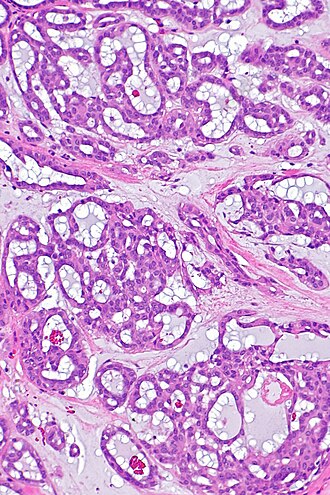 Cribriform adenocarcinoma of the minor salivary gland. H&E stain. | |
|
| |
| Synonyms | cribriform adenocarcinoma of the tongue |
|
| |
| LM | cribriform and solid architecture, cytology similar to papillary thyroid carcinoma (irregular nuclear membranes, nuclear overlap), usually covered by an intact squamous epithelium |
| LM DDx | polymorphous low grade adenocarcinoma, papillary thyroid carcinoma |
| IHC | CK7 +ve, vimentin +ve, CD117 -ve/+ve, S-100 +ve |
| Site | head and neck - usually tongue |
|
| |
| Prevalence | very rare |
| Prognosis | good |
| Clin. DDx | other salivary gland tumours |
| Treatment | excision |
Cribriform adenocarcinoma of the minor salivary gland, abbreviated CAMSG, is a rare malignancy of the salivary gland, typically of the tongue.[1]
It is also known as cribriform adenocarcinoma of the tongue, abbreviated CAT.
The World Health Organization lumps this tumour with polymorphous adenocarcinoma, a decision that is considered "controversial".[2]
General
- Rare - small case series and case reports.
- Typically tongue - first described there.[3]
- Good prognosis[1] - on limited data.
Microscopic
Features:
- Typically covered by an intact squamous epithelium.[1]
- Growth patterns - cribriform and solid.
- Cytology similar to papillary thyroid carcinoma.[1]
- Irregular nuclear membranes (raisin-like nuclei).
- Nuclear overlap.
DDx:
- Polymorphous adenocarcinoma (previously polymorphous low-grade adenocarcinoma) - morphology more varied.
- Papillary thyroid carcinoma.
Images
www
IHC
Features:[1]
- AE1/AE3 +ve (12/12 cases).
- CAM5.2 +ve (12/12 cases).
- CK7 +ve (12/12 cases).
- CK8 +ve (12/12 cases).
- CK18 +ve (12/12 cases).
- S-100 +ve (12/12 cases).
- Vimentin +ve (12/12 cases).
- CD117 -ve/+ve (5+ve/12 cases).
Molecular
- Rearrangement of the PRKD genes (PRKD1, PRKD2, PRKD3).[5]
See also
Referencess
- ↑ 1.0 1.1 1.2 1.3 1.4 Skalova, A.; Sima, R.; Kaspirkova-Nemcova, J.; Simpson, RH.; Elmberger, G.; Leivo, I.; Di Palma, S.; Jirasek, T. et al. (Aug 2011). "Cribriform adenocarcinoma of minor salivary gland origin principally affecting the tongue: characterization of new entity.". Am J Surg Pathol 35 (8): 1168-76. doi:10.1097/PAS.0b013e31821e1f54. PMID 21716087.
- ↑ Vander Poorten V, Triantafyllou A, Skálová A, Stenman G, Bishop JA, Hauben E, Hunt JL, Hellquist H, Feys S, De Bree R, Mäkitie AA, Quer M, Strojan P, Guntinas-Lichius O, Rinaldo A, Ferlito A (July 2018). "Polymorphous adenocarcinoma of the salivary glands: reappraisal and update". Eur Arch Otorhinolaryngol 275 (7): 1681–1695. doi:10.1007/s00405-018-4985-5. PMID 29761209.
- ↑ Michal, M.; Skálová, A.; Simpson, RH.; Raslan, WF.; Curík, R.; Leivo, I.; Mukensnábl, P. (Dec 1999). "Cribriform adenocarcinoma of the tongue: a hitherto unrecognized type of adenocarcinoma characteristically occurring in the tongue.". Histopathology 35 (6): 495-501. PMID 10583573.
- ↑ 4.0 4.1 Michal, M.; Kacerovska, D.; Kazakov, DV. (Jul 2013). "Cribriform adenocarcinoma of the tongue and minor salivary glands: a review.". Head Neck Pathol 7 Suppl 1: S3-11. doi:10.1007/s12105-013-0457-9. PMID 23821209.
- ↑ Weinreb, I.; Zhang, L.; Tirunagari, LM.; Sung, YS.; Chen, CL.; Perez-Ordonez, B.; Clarke, BA.; Skalova, A. et al. (Oct 2014). "Novel PRKD gene rearrangements and variant fusions in cribriform adenocarcinoma of salivary gland origin.". Genes Chromosomes Cancer 53 (10): 845-56. doi:10.1002/gcc.22195. PMID 24942367.

